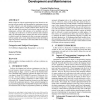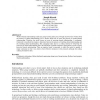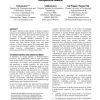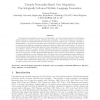53 search results - page 9 / 11 » An empirical framework for designing social products |
ICSE
2011
IEEE-ACM
13 years 7 hour ago
2011
IEEE-ACM
Much research in software engineering have been focused on improving software quality and automating the maintenance process to reduce software costs and mitigating complications ...
CHI
2004
ACM
14 years 9 months ago
2004
ACM
Emerging technologies offer new ways of using entertainment technology to foster interactions between players and connect people. Evaluating entertainment technology is challengin...
ETS
2002
IEEE
13 years 8 months ago
2002
IEEE
Without shared understanding, hardly any group learning takes place. Though much has been written about the essence of shared understanding, less is known about how to assess the ...
CRITICAL
2005
13 years 10 months ago
2005
This paper addresses design agendas in Human-Computer Interaction and neighbouring fields motivated by the mixing of areas that were mostly kept separate until recently, such as m...
UMUAI
2010
13 years 7 months ago
2010
Conversation is an essential component of social behavior, one of the primary means by which humans express intentions, beliefs, emotions, attitudes and personality. Thus the deve...




